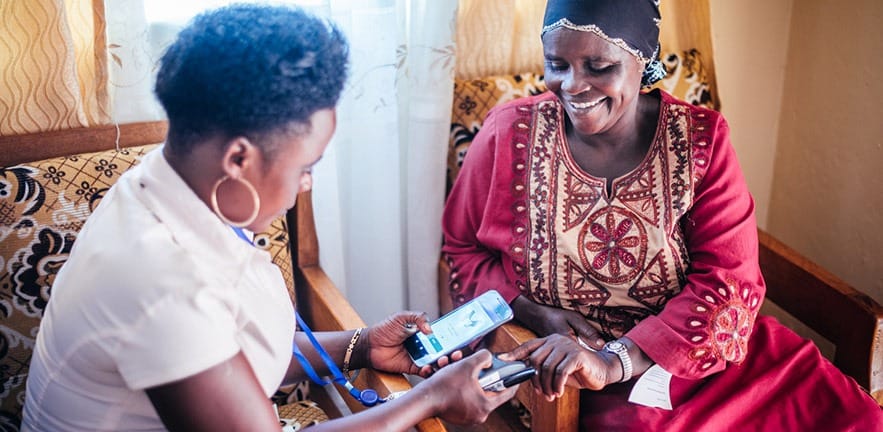The popular conception of fingerprinting often stems from television detective drama, when a perfect print – with clear arches, loops and whorls – emerges from a powder-dusted window to pin the crime on a tricky culprit, perhaps a well-dressed gentleman safecracker. It is TV fiction, after all.
In the real, developing world, fingerprints are usually not so perfect or so clear. So a startup connected to Cambridge Judge Business School is using advanced technology to make identification possible for even those with far-from-perfect “last-mile” fingerprints.
“Most biometric systems in use today were designed by and for people in high-income countries,” says Toby Norman, co-founder and CEO of Simprints, which is developing biometrics to help identify and reach the 1.1 billion people around the world without formal identification – a technique that can help medical professionals reach, treat and record these needy people. “In fact, many people in developing countries who have laboured with their hands have burns, scars and worn fingerprints that make them far less easy to read.”
Toby holds a PhD in Management Science earned at Cambridge Judge Business School, and Cambridge-based Simprints was one of the first startup teams to be supported by the Accelerate Cambridge programme at the School’s Entrepreneurship Centre.
“I did part of my PhD research among community health workers in Bangladesh, and was really shocked by the difficulty in identifying patients – many of whom had no formal government ID, had both surnames and family names that overlapped with many other people in their community, and didn’t even know their precise date of birth,” says Toby. “We think that the technology we’re developing can make a big, measurable difference in delivering healthcare.”
Simprints has just been awarded a $2 million “Transition to Scale” innovation grant from Saving Lives at Birth: A Grand Challenge for Development, a programme funded by the Gates Foundation and other donors, that will help better reach these last-mile recipients. The grant – one of just 15 awarded out of 550 applications – will specifically be used to allow Simprints to scale up a maternal healthcare programme in Bangladesh, to track whether 2.56 million expecting mothers across the south Asian country are receiving proper ante and postnatal care.
With a matching $200,000 grant from Cambridge-based chip designer ARM, Simprints will also expand its capacity to integrate into other global technology systems around the world, allowing Simprints technology to be used in more sectors and contexts. Currently, Simprints technology is in use in Bangladesh, Nigeria, Uganda, Nepal, Zambia, Kenya and Afghanistan.
In addition, Simprints received a separate Seed Fund grant for $250,000 from Saving Lives at Birth to develop the world’s first neonate scanner – based on research at the University of Cambridge that found it is possible to use biometric fingerprinting on infants as young as six months old. Previously, it has been widely believed that biometrics are only useful once a child reaches the age of two, so this new technology could help deliver vaccines and develop nutrition programmes for many more infants in need.
“We’re delighted that this new grant money will allow the company to scale up its exciting project at Bangladesh,” says Hanadi Jabado, Executive Director of the Entrepreneurship Centre at Cambridge Judge. “From early days on the Accelerate Cambridge programme, it was clear that Toby had a vision and strategy for Simprints to make a real difference in developing countries such as Bangladesh, along with a realisation that scaling up would be an essential part of that – and this is clearly now happening.”
Simprints tested its sensor against five other commercial sensors in low-resource settings, and found that it was 228 per cent more accurate than the next best in scanning the scarred and worn fingerprints typical in some parts of the developing world. The Simprints biometric system is optimised to such conditions: the sensors, templates which encode a fingerprint’s unique characteristics, and matching algorithms are all tailored to low-resource settings, backed by data from more than 125,000 fingerprints.
“In our field tests with 217 Zambian manual farmers, 84 per cent had some damage to their fingerprints,” according to a recent article co-written by Toby in the journal Biometric Technology Today. “In standard industry evaluations of system performance, error metrics are typically measured from biometric features captured in highly controlled laboratory settings from individuals employed in non-manual work.”
By designing for context, Simprints aims to overcome the common pitfalls faced by many technology companies in the developing world. “Advanced technology is only one piece of the puzzle,” says Toby. “Effective training, an intuitive workflow, and cultural acceptability are necessary for technology to survive and grow.” In the case of Simprints, these processes were envisioned with and by community health workers at non-government organisation BRAC, the same ones who in the upcoming years will be providing care to millions of mothers across Bangladesh.
The Saving Lives at Birth partnership, which was launched in 2011, includes the Bill & Melinda Gates Foundation, the US Agency for International Development, the Norwegian Agency for Development Cooperation, Grand Challenges Canada, the UK Department for International Development, and the Korea International Cooperation Agency.
The partnership aims to find scalable solutions to address the 303,000 maternal deaths, 2.7 million neonatal deaths, and 2.6 million stillbirths that occur each year around the world.


